 |
Audio Asylum Thread Printer Get a view of an entire thread on one page |
For Sale Ads |
 |
Audio Asylum Thread Printer Get a view of an entire thread on one page |
For Sale Ads |
74.105.253.142
In Reply to: RE: Class A makes all the differences posted by Leo loves music on February 01, 2025 at 19:36:43
I hope the sound isn't pretty on almost everything. Then it's a 'musical' coloration. Sometimes the extra headroom of AB is worth some loss of low end linearity from class A. It depends on the system and the input.
Follow Ups:
Your speakers and equipment have to up to certain level including cabling to tell the differences. On my Plinius there is a switch between class A and class AB. There is no comparation between class A and class AB. Once I listened to class A, I never want to go back to class AB. Too bad I can't listen to class A all day. Too much heat and electricity.
Agree. In my setup years ago the Pass Labs 150.5 AB was noticeably better sounding overall vs the purely Class A Aleph 3. As you said, "it depends".

They're very different amps. The 150.5 are bridged SETs(single ended transistors) which effectively gives the advantages of both. The 30 is purely single ended which is inherently non linear(which Nelson Pass acknowledges) in what I consider a bad way, it amplifies the negative half of the signal differently than the positive half.
I have had the Aleph 3 and Aleph 30. Both were warm, but sounded a touch syripy. I have a little 30 watt AX30 Pass amp. Way cleaner, and more powerful. The 150.5 should easily sound better than those old Pass Pure A amps
And what you said supports my assertion that Class A is not universally better sounding than other classes of operation. It depends on the amp. Some Class A are excellent, others not so much. Which can be said of Class AB too.P.S. I had the Aleph 3 and the 30 too. Neither were very good unless you like that syrupy warm, smooth, slightly veiled sound, with rolled off frequency extremes, and very polite dynamics (no punch). Yet people rave about these amps because they're supposed to since they're from Nelson Pass. I scratched my head and said WTF [What's the Fuss] ?
Edits: 02/03/25 02/03/25 02/03/25
Your first sentence sums it up - it matter not what Class an amp uses, but the end result.
In my multi-amp home listening phase about 4 years ago (after deciding to move away from tube amps) I bought or borrowed Class A, AB and D amps in the 3-8K GBP price range. One of the Class A sounded great (Accuphase) but another (Sugden) sounded about as dull as any other amp apart from a Quad and (to my surprise and disappointment) the Benchmark that was so raved about by a fellow Avantgarde speaker user.
In the end, the choice was between the Class A Accuphase (a little too "polite"), the Class AB GamuT (great sound, but a bit naughty when powered up or down), or the Class D NAD M33. I chose this last amp (no regrets after 4 years), but have recently also bought Atma-Sphere Class D monos.
It's what they sound like that matters, not how they do their job.
tube -> class D
That was a big jump.
I went from a pair of lovely sounding Manley Neo-Classic 250 tube amps, 10 EL34 tubes per monoblock. Wanting to no longer deal with the heat, weight, and tube replacement costs I investigated various Class D amps. I went through a few Class AB solid-state amps too but over time I noticed that Class D amps were improving. The other more 'traditional' amps had already plateaued. There was nothing new there except even more creative hyperbole in the marketing literature. Anyway, fast forward a handful of years and I too wenttube -> class D, and with no regrets.
Repairing and retubing the Manley Neo-Classic 250 monoblocks
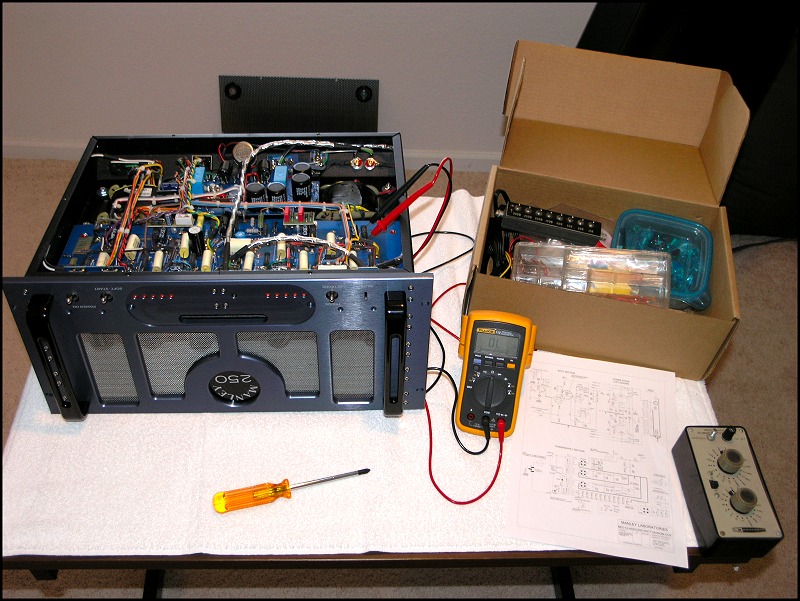
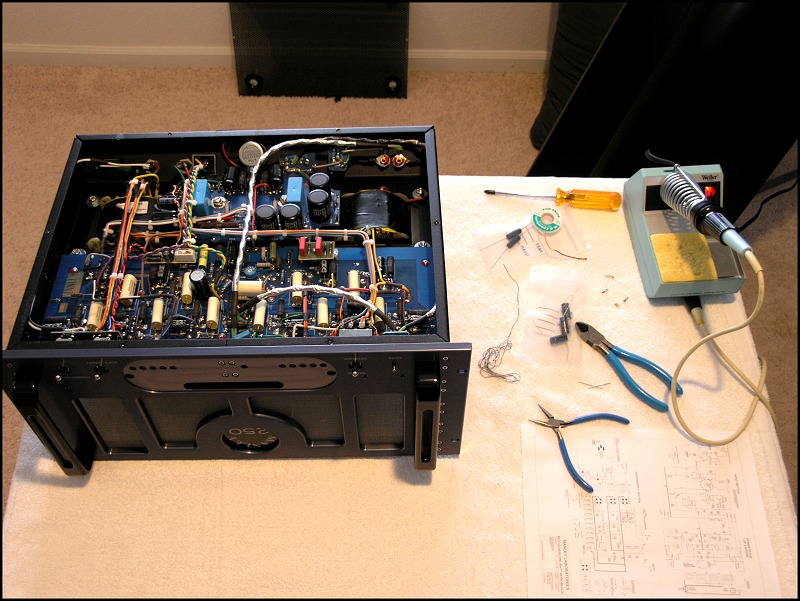
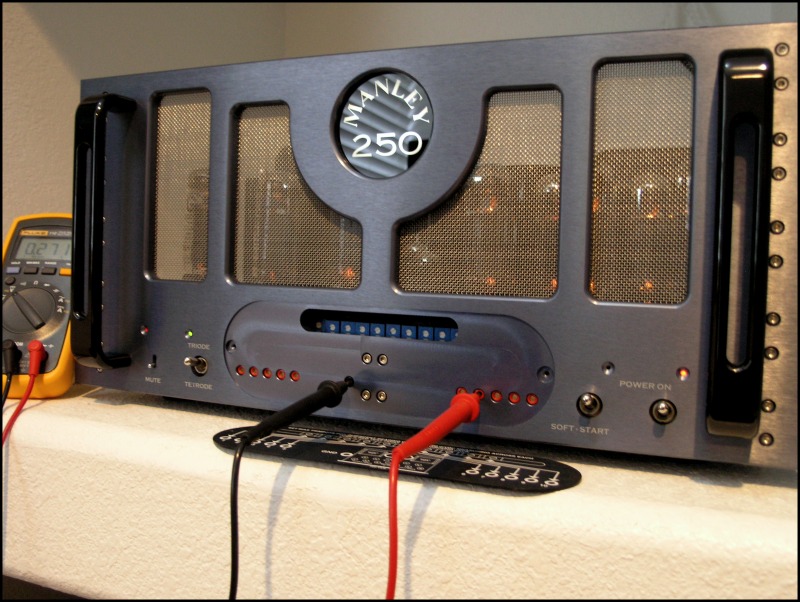
Tried a couple big boy Bryston amps. Big boy mistake.
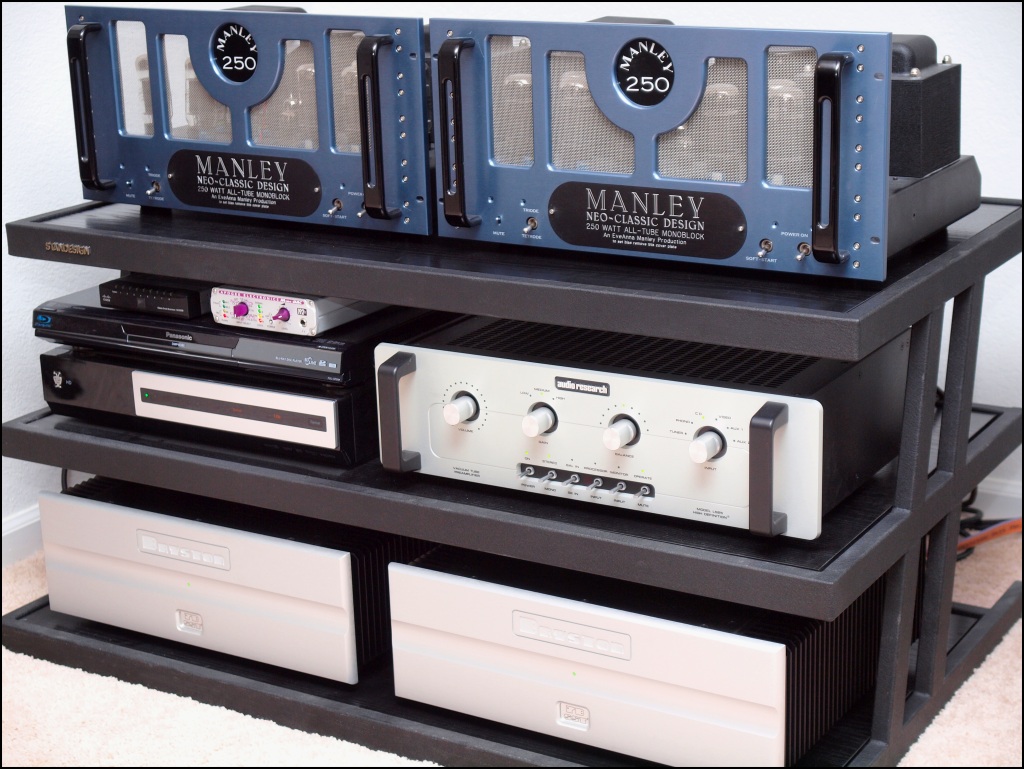
Manley tube monoblock & Wyred4Sound SX-500 Class D monoblock.
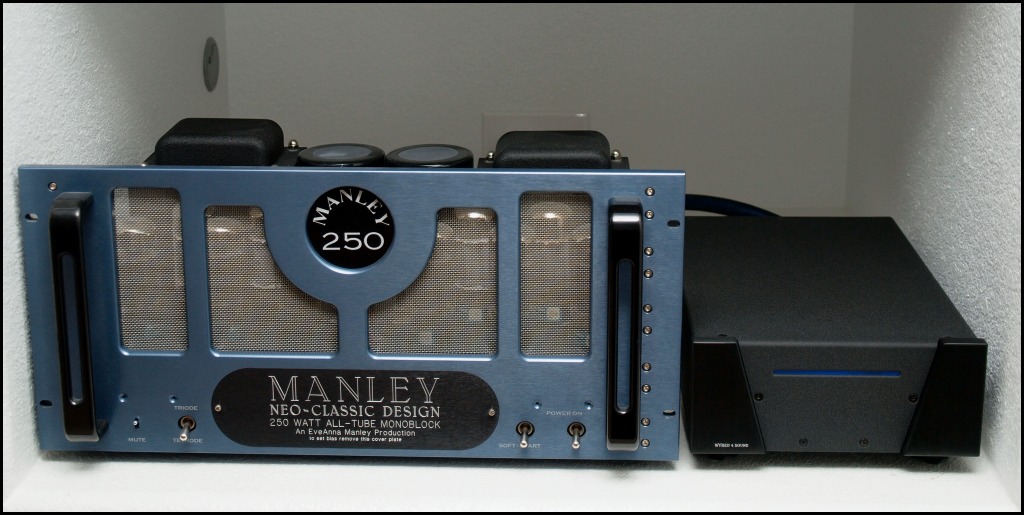
The Wyred4Sound Class D was very good but not quite there. However, I'd take these Class D monoblocks any day over the
Brystons. This was 14 years ago! Class D has improved noticeably since then. I'm sold.P.S. I was running Thiel speakers back then and they required big power to sound their best.
Edits: 02/04/25 02/04/25
.
.

Funny, your description of these two amps is exactly the same as mine. Not sure if "syrioy" is a real word, but that is what I heard. I bought the 30 as I was unhappy with they first one. Same results. But they both were praised in the rags. They reminded me of old tube sound before tube sound was refined.
Edits: 02/03/25
Interesting. I had the Aleph 3 and bought the Aleph 30 thinking it would be better but as you said, they were the same lackluster amps. The Aleph 3 would at least double power into 4 Ohms while the Aleph 30 would not.These were supposed to sound good. They're from Nelson Pass after all. But I thought they were pretty lame.
Aleph 3 :
30wpc 8-Ohms
60wpc 4-Ohms
Idle power consumption: 250-Watts from AC mainsAleph 30 :
30wpc 8-Ohms
50wpc 4-Ohms
Idle power consumption 200-Watts from AC mainsMy repurposed Pass Labs Aleph 3 Class-A amp
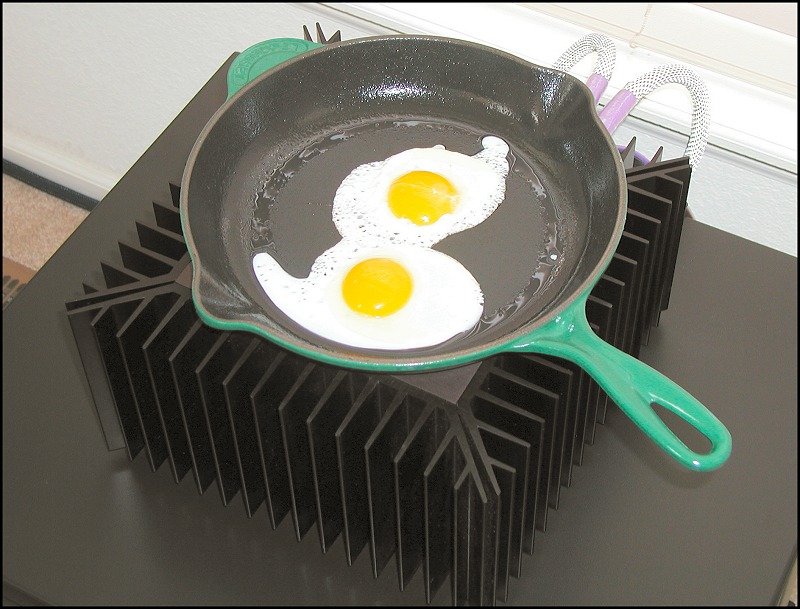
Edits: 02/03/25
I don't know what's wrong with Pass Labs class A amps. On my Plinius amp, there is a switch which can change between class A and class AB on the fly. Both classes can output 125W. In my system, class A sounds very noticeably better than class AB. No question about.
Define better. We all have personal tastes. I hope not to hear musical. That's a non answer. High fidelity isn't musical ; it's supposed to be accurate. The question in an audio world with imperfect devices is what compromises to make to come close to accurate. Is it frequency? Is it dynamics? Is it distortion? It's all the above and balancing them to some degree varies with each individual. I recall David Berning showing me an amp with variable feedback that sounded better the higher the distortion because the dynamics improved. Oh and the amp was almost pure class B.Your particular example of class A may be right for you. I'm not sure it is universal.
Edits: 02/02/25
You need a reference. Otherwise you will get used to class AB and forget the sound of class A.
My Plinius can output 125 class A watts at 8ohms. It can drive most speakers. When you have a chance to listen to one of the Plinius class A amps, I bet you will like them.
I think I can probably get the performance of Class-A by listening to a pair of STAX electrostatic headphones. I own the top-of-the-line SR-X9000 headphones amplified by the SRM-700T driver unit. These STAX headphones represent the best sound I've ever heard, and they're rated "A+" in Stereophile's Recommended Components. However, I still enjoy listening to my Magnepan speakers powered by Hypex Nilai 500-watt monoblock class-D amplifiers. In fact, I enjoy listening to my Mini Maggie speakers just as much.
Go figure!
...and mind breaking for some.
There was time when audiophiles were brainwashed into thinking Class A was always best and that may have been the case in grandpa's day. Times have changed but some audiophiles never do ;-)
Did you sell your PS Audio M1200 Class D monos?

The main reason I switched to class-D amplifiers is because I didn't want to spend the money for class-A or even class-A/B. When I saw the PS Audio M700 monoblocks rated Class "A" in Stereophile's Recommended Components, I decided to give them a try. However, PS Audio convinced me to wait for their new M1200 monoblocks by enticing me with a 25% discount. When I finally received them a couple of months later, I was absolutely amazed at their sound quality when driving my Thiel CS3.7 speakers.
The M1200's also sounded great with my Mini Maggie speakers, but I didn't think I needed 1200-wpc, so I took a chance on the Hypex Nilai 500 monoblocks, again because they were cheap at only $995 each. To my surprise and amazement, the Hypex Nilai 500 monoblocks sounded just as good if not better driving my Mini Maggie's.
To answer your question, "No, I haven't sold my PS Audio M1200 monoblocks."
It seems I rarely sell anything anymore, although I did sell my SOTA Millennia turntable. Anyway, I still have my Thiel CS3.7 speakers, so I'm also keeping my M1200 monoblocks. I'm giving them both to my son as soon as he gets moved into his new place.
Happy listening!
John Elison
Class A is not universally 'better'. Similarly triode mode on many tube amps isn't universally 'better' than ultralinear.

The bias for UL is very high. 60% of class A for example 6550. On the other hand the class AB for SS is very low. Nobody ever used 60%.
I strongly recommend that one should check out Plinius class A amps before giving any assessment for the amps.
You've proven one thing. You prefer Plinius amps in your system. The best system I've ever heard was all class D amps. And it was DIY.
Happy?
non answer since I didn't come close to saying that. Plus probably to make things worse the entire system is digitized including speaker control and room control. I'm just saying an audio system is a system and you're auditioning the integrated total and that's what's good(or bad).
Looking at his other posts on the topic I think he's saying what I am basically saying:
- Class A as group is not universally better than other classes of operation.
- He prefers his Class D amp. I'm liking mine too.
But that's not to say Class D is universally better - "it depends".

Digital signal is sampled from analog signal. It can be very close to the original signal. However saying it is better than the original is kind over stated.
"Digital signal is sampled from analog signal. It can be very close to the original signal. However saying it is better than the original is kind over stated. "
No one in this thread, not even me, has said or implied that.
P.S. BTW Class D is not "digital"

Well, I'm not biased in assessing the sound of an amp based on how it is biased. If I were, I probably wouldn't be enjoying my Class D amp as much as I am.;-)
I'm sure the Plinius is a wonderful sounding Class A amp. Same for some Pass Labs, Coda, Accuphase, Luxman, etc. But IMHO Class A amps have a certain appeal to old school thinking.
Edits: 02/02/25
"a certain appeal to old school thinking". And what is the matter with that? Hunh, hunh, hunh? -)
LowIQ
highIQ
| FAQ |
Post a Message! |
Forgot Password? |
|
||||||||||||||
|
||||||||||||||
This post is made possible by the generous support of people like you and our sponsors: